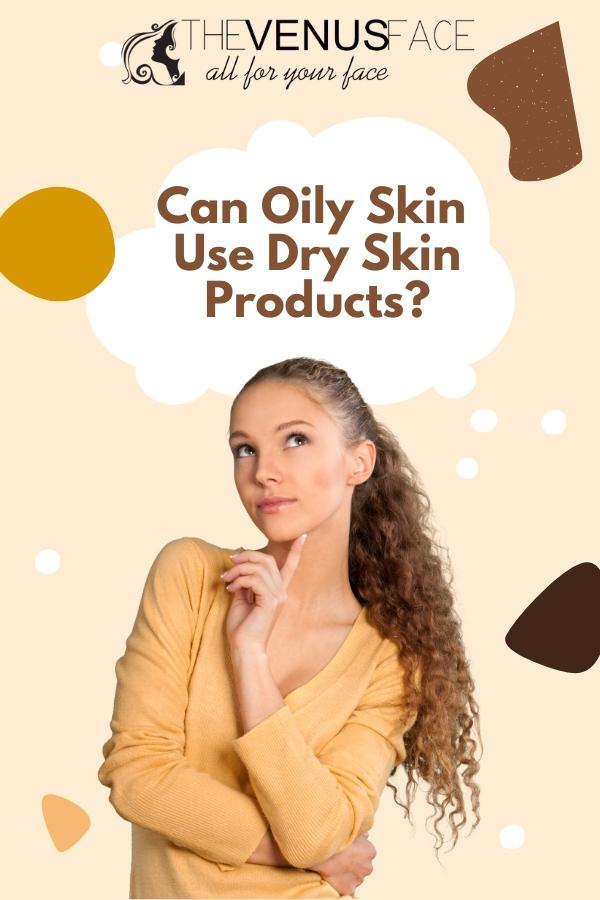Can oily skin use dry skin products? Read on.
Oily skin is usually considered healthy, but it’s not always the case. Oily skin is generally shiny and has large pores visible to the naked eye. Dry skin can be dehydrated, flaking, or tight with visible pores too, which isn’t healthy skin either. This type of skin lacks oil and water so it’s important to provide extra hydration.
Because of the differences in the texture and appearance of oily and dry skin types, the products suitable for oily skin would be off-limits to those with dry skin and vice versa. Therefore, it is a terrible idea to use dry skin products on oily skin.

What happens if you use a dry skin product on oily skin?
Dry skin products are usually oil-based and heavier than the formulas designed for oily skin. The purpose is to moisturize and soothe dry skin more than enough (because that’s what dry skin needs). Thus, if you use products specially designed for dry skin types on oily skin, then chances are the makeup would not last long and melt off your face by mid-day. Besides that, your T-zone would become oilier and your pores would be clogged. Moreover, breaking out, pimples, blackheads, and whiteheads would be inevitable.
More: How to Make Skincare Absorb Better w/ 7 Tips
Can I use a dry skin moisturizer on oily skin?
You can, but just because you can, doesn’t mean you should. A dry skin moisturizer makes oily skin feel heavy and greasy, which accentuates the appearance of large pores due to the layer of product built upon the surface. If you are an oily skin type, then it is best to apply a light moisturizer that is oil-free and non-comedogenic.
Manufacturers design products for oily skin and dry skin for reasons. Why should you try to interchange the two? With so many options available for you to choose from, it’s best to stick to what works best for your skin type.
More:
Can oily skin change to dry skin?
Yes, it can. Any skin type can change to any skin type. It is important to consider the climate factors that could affect the health of your skin.
For example, when you move from a tropical country to an area with colder weather, it is normal for your skin type to change because the difference in temperature plays a huge factor. The dryness of cold air can dehydrate your oily skin and cause it to be flaky instead.
Age is also a factor to consider. As you get older, your skin naturally becomes drier due to the decrease in sebum production, collagen, and elastin levels. This causes wrinkles or crow’s feet around the eyes. Furthermore, your skin tone could become uneven because the blood flow decreases, causing patches of redness (i.e., rosacea) on cheeks and lips as well as dark spots from sun damage throughout life. Fun fact: oily skin ages better than dry skin!
If you find yourself experiencing these issues with your skin type change, then it’s time to switch up your skincare routine a bit by incorporating products that are more suited for dry skin types.
More:
Can you have both dry and oily skin?
Yes, and it is a sign that you have a combination skin type. When your skin is dry or normal in some places and oily in others, it’s known as a combination skin type.
What to do with dry-oily skin?
Dry and oily skin at the same time means that you have combination skin. The skincare routine for combination skin is more complicated because you have to address the needs of both types.
For instance, you would need a lightweight moisturizer for your dry areas and a rich one for your oily areas. Also, you would have to tone down the oily skin with a toner and use a gentle exfoliator in order to maintain a healthy balance.
Treating combination skin is a long story, which could be a blog post in itself. We will get into that in another article.
More: Skin Care Routine for Oily Skin in Summers & Winters
Why did my skin go from oily to dry?
There are many factors that can cause your skin to change from oily to dry. It could be the climate of where you live, aging, stress level, product buildup…
Climate change
The environment can have a big impact on your skin type. If you live in a climate that is colder and drier, your body will stop making as much oil to protect itself from the drying out effect of the cold weather. Therefore, your skin might become drier than it used to be.
Aging
Age can also cause your skin to go from oily to dry. As you get older, your sebaceous glands produce less oil and therefore there is less oil on the surface of your skin. The sebaceous glands can also become clogged and stop production, causing your skin to be blotchy and flaky.
Stress level
When you experience stress, your body goes through many changes, including hormonal levels which can play a role in how oily or dry your skin could become. Hormonal fluctuations are likely to occur during adolescence, pregnancy, menopause, and pre-menstrual syndrome. This contributes to acne breakouts when oil glands are overactive because of an excess amount of male hormones called androgens in your body. The spike in sebum production causes pores to get clogged resulting in breakouts on the face, chest, back, shoulders, etc.
What causes product buildup?
Hair products such as gels and pomades are especially known for their ability to block the pore and form a film on the skin. Not only do these products clog pores, but they also increase the oiliness of your skin in the long run. This is because the accumulation of too much oil causes more frequent breakouts and skin problems such as blackheads and whiteheads.
Final thought
Yes, your skin can transform from oily to dry, combination, or sensitive. There are many factors that cause these changes in the way our skins behave like age and climate change. However, it is important to understand how these changes occur so you know what products will work best for each situation. This article provides some insight on the different types of skin and their corresponding skincare routine needs as well as a few tips on how to treat them when they need extra attention.
References: https://www.today.com/style/5-different-skin-types-which-type-skin-do-you-have-t152786


